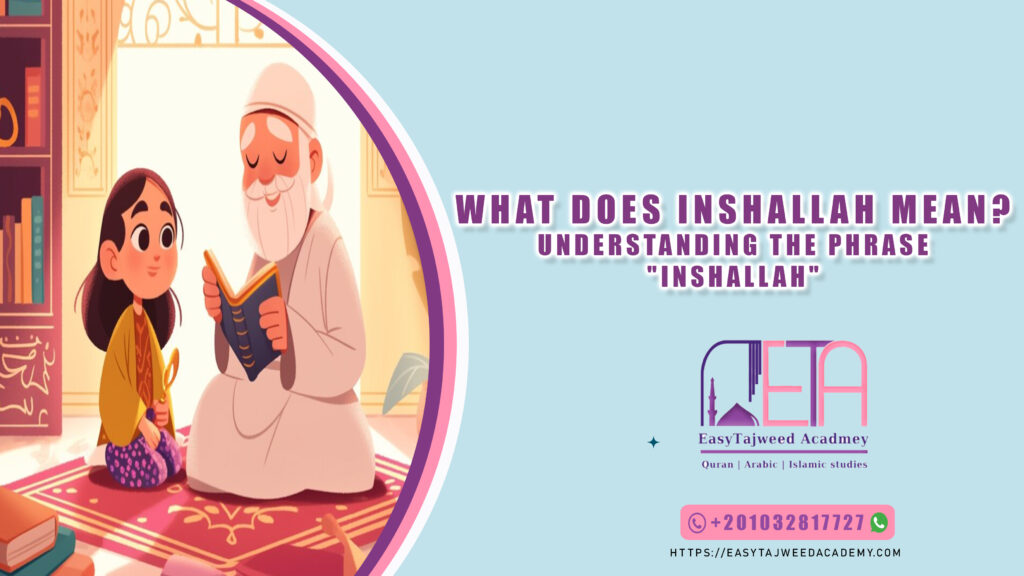what does inshallah mean? Inshallah is a commonly used phrase in Arabic-speaking cultures, especially among Muslims, but what does Inshallah mean? The phrase “Inshallah” is a combination of three Arabic words: “In” meaning “if,” “Sha'” meaning “wills,” and “Allah,” which translates to “God.” So, the literal translation of “Inshallah” is “If God wills.” In everyday conversations, people use Inshallah to express hope or intention for something to happen in the future, acknowledging that the ultimate outcome is in God’s hands.
Inshallah Meaning in English
When looking for the meaning of Inshallah in English, it can be understood as “God willing” or “if God wills it.” The phrase reflects a deep belief in the divine will, which is an essential part of Islamic teachings. Whether discussing plans, hopes, or future actions, Muslims often say “Inshallah” to show humility and faith that nothing happens without God’s permission.
What Does Inshallah Mean in Arabic?
The Arabic Inshallah meaning holds both linguistic and spiritual significance. In Arabic, “Inshallah” signifies an acknowledgment of God’s supreme power over all things. The phrase is deeply embedded in both religious and cultural contexts. When someone says “Inshallah” in Arabic, they are conveying more than just hope; they are submitting to the idea that only God controls the future.
What Inshallah Means in Different Contexts
While the literal translation of “Inshallah” is clear, its usage can vary depending on the situation. Here are a few common contexts where you might hear the word and what it signifies:
- In Everyday Conversations: People use “Inshallah” casually when discussing plans, such as, “I’ll visit you tomorrow, Inshallah.” Here, it means the person hopes to visit but recognizes that unforeseen circumstances could prevent it.
- In Religious Practices: Inshallah is frequently used in religious contexts. When Muslims speak of their faith, they often say “Inshallah” to remind themselves and others that their actions depend on God’s will.
- In Formal Settings: When used in a more formal setting, “Inshallah” is a polite way of saying that one hopes for a certain outcome but respects that it is out of their control.
Inshallah Khair Meaning
Another variation of the phrase is “Inshallah Khair,” which means “God willing, it will be good.” This phrase combines the meaning of Inshallah with the word “khair,” meaning “good.” It’s often used when someone wishes for a positive outcome in a potentially uncertain situation. For example, if someone is worried about the results of an exam, they might say, “Inshallah Khair,” meaning they hope for a good result if God wills it.
Inshallah Mashallah Meaning
People often ask about the meaning of Inshallah and Mashallah together. While both are religious phrases, they are used in different contexts. “Inshallah” means “God willing,” while “Mashallah” means “God has willed it” or “as God willed.” Mashallah is typically used to show appreciation or admiration for something that has already happened, while Inshallah refers to future events. For example, after seeing a beautiful baby, someone might say “Mashallah” to express admiration, and then add “Inshallah” when talking about the baby growing up healthy.
What Does Inshallah Mean in English Conversations?
The meaning of Inshallah in English can sometimes confuse non-Arabic speakers. When used in English-speaking settings, “Inshallah” still carries the same significance: hope coupled with the understanding that the future is not entirely within human control. People use it in casual conversation, often after making plans, to indicate their reliance on divine will.
Meaning of Inshallah in Arabic Culture
In Arabic culture, the phrase “Inshallah” is more than just a linguistic habit; it reflects a worldview centered on faith and submission to God’s will. Whether discussing minor plans or life-changing events, saying “Inshallah” reminds everyone involved that, no matter how well we plan, the ultimate outcome is in God’s hands. It’s a way of maintaining humility and trust in the face of uncertainty.
Understanding What Inshallah Means
So, what does Inshallah mean? The phrase carries a profound meaning in both everyday and religious contexts. The meaning of Inshallah in English translates to “God willing,” but its significance extends beyond simple hope. It expresses trust in God’s plan, acceptance of the unknown, and a recognition that humans cannot control everything. Whether used in casual conversations or serious discussions, “Inshallah” reflects a deep-rooted cultural and religious belief in the power of divine will.
If you’ve ever wondered “what does Inshallah mean in Arabic,” or sought the inshallah meaning in English, now you understand its depth and importance. From “Inshallah Khair” to “Inshallah Mashallah,” the phrase conveys much more than just words—it’s a statement of faith and humility. In every usage, the phrase reminds us that, in the end, it is God who decides what will happen.
The Deeper Spiritual Meaning of Inshallah
Understanding what Inshallah means goes beyond its linguistic or cultural context; it holds deep spiritual value, especially within the Islamic faith. The phrase is rooted in the Islamic belief of Tawakkul, which is the concept of trusting in God’s plan while still putting forth personal effort. By saying “Inshallah,” a person not only expresses hope but also acknowledges that they are not the ultimate controllers of their destiny. This humility and surrender to divine will form a key pillar in Islamic spirituality.
The meaning of Inshallah reminds believers to strike a balance between working toward their goals and understanding that the final outcome is in God’s hands. It teaches patience, reliance on divine wisdom, and acceptance of whatever comes their way, whether good or bad. This mindset offers comfort, especially in uncertain times, because it allows individuals to place their trust in a higher power.
Inshallah in Everyday Life
In many parts of the world, the Inshallah meaning is woven into everyday life. Whether you’re traveling in the Middle East, talking to Muslim friends, or engaging with Arabic-speaking communities, you will frequently hear people saying “Inshallah.” But it’s not just limited to personal conversations; it’s used in politics, business, and social gatherings. Leaders, for instance, might say “Inshallah” when talking about future plans for their country, recognizing that success is not solely in their control. Similarly, in business, when discussing deals or projects, both parties might include “Inshallah” as a respectful acknowledgment that the final outcome depends on factors beyond human intervention.
For example, in casual conversation, you might hear:
- “We will meet next week, Inshallah.”
- “The project will be completed on time, Inshallah.”
Here, the speaker is hopeful, but they are also cautious, leaving room for life’s uncertainties. This is how the meaning of Inshallah manifests in real-life scenarios, where hope, faith, and acceptance intersect.
The Importance of Inshallah in Building Patience and Gratitude
One aspect of what Inshallah means is its role in fostering patience and gratitude. By saying “Inshallah,” people are reminded that, despite their best efforts, things may not always go according to plan. This helps in cultivating patience because it acknowledges the unpredictable nature of life. Additionally, if something does come to pass, believers are encouraged to be grateful, understanding that God has allowed it to happen.
When things don’t go as expected, the meaning of Inshallah offers comfort. It helps people accept setbacks with grace, trusting that what happens is part of a larger, divine plan. In this way, “Inshallah” is a spiritual practice in itself, instilling virtues like patience, gratitude, and faith.
Misconceptions and the Misuse of Inshallah
While Inshallah means “God willing,” and is a statement of faith, it is sometimes misinterpreted or misused in different cultures. Some may use “Inshallah” to avoid giving a definitive answer or commitment, especially in non-religious contexts. This has led to the humorous notion that when someone says “Inshallah,” they may not actually intend to follow through with their plans.
For example, someone might say:
- “I’ll send you the documents tomorrow, Inshallah.”
In such cases, it could be perceived that the speaker is being non-committal, using the phrase as a way to avoid accountability. However, this is a cultural rather than a religious issue, as the true Inshallah meaning is one of sincerity and respect for God’s will.

Inshallah in Popular Culture and Language
The influence of Inshallah has extended beyond Arabic-speaking communities. In recent years, the word has made its way into global pop culture and various languages, especially through media and the internet. For instance, non-Arabic speakers may use “Inshallah” when discussing uncertain future events, either as a sign of cultural awareness or because the word has no direct equivalent in their language.
Movies, TV shows, and even music have occasionally featured the term, introducing the Inshallah meaning to wider audiences. It’s not unusual to see people from different backgrounds adopting “Inshallah” into their vocabulary, sometimes humorously but often with genuine respect for its meaning.
What Does Inshallah Mean in a Global Context?
Given the widespread use of Inshallah across different cultures, it’s essential to understand the phrase in its full context. Whether in a religious or secular setting, the meaning of Inshallah serves as a reminder of life’s unpredictability and the importance of faith. For Muslims, saying “Inshallah” is a way to live out their religious principles in daily life, while for others, it might be a useful phrase to express hope or uncertainty about the future.
In the global context, the phrase has become a bridge between languages and cultures, showing how one word can carry significant meaning across diverse communities.
The Meaning of Inshallah
In summary, what does Inshallah mean? At its core, “Inshallah” means “If God wills” or “God willing.” It’s a phrase used by millions of people worldwide, deeply rooted in Islamic teachings and culture. The meaning of Inshallah extends beyond its translation; it represents trust in divine will, humility, patience, and hope. Whether used in everyday conversation or religious discourse, “Inshallah” serves as a reminder that while we plan and strive for certain outcomes, the final result is always in God’s hands.
From expressions like Inshallah Khair (hoping for good) to distinctions like Inshallah Mashallah, understanding what Inshallah means offers valuable insight into the rich interplay of language, culture, and spirituality. So next time you hear or use “Inshallah,” remember that it’s more than just a phrase—it’s a way of looking at the world with faith, humility, and hope.


